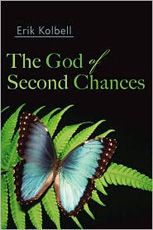Erik Kolbell is a freelance writer, psychotherapist, and former Minister of Social Justice at the historic Riverside Church in New York City. He is the author of What Jesus Meant: The Beatitudes and a Meaningful Life — one of our Best Spiritual Books of 2003 — and Were You There? Finding Ourselves at the Foot of the Cross. In this hopeful volume, he describes the spiritual journey as filled with many excursions; we try to stay on the path of faith but slip off and back on again like the prodigal son in the story of Jesus.
Kolbell has organized the elegant essays in this collection around 12 words that all contain the Latin prefix Re which simply means to go back to, to do again. The themes are restoration, rebirth, reconciliation, remembrance, redemption, revelation, resurrection, reflection, religion, receiving, retreat, and revival. He notes at the outset: "They are our expressions of hope, each in its own way, that no matter how far we might wander from a truly integrated life, we can always find our way back, and when we do, we will be welcomed by our God of second chances."
During these raucous times of militarism, classism, and political expediency, it is fitting that we reconsider the amplitudes of Divine grace and reconnect with the sources of spiritual renewal. Kolbell ponders the depth charges of exile, the wounded self in a modern world, the search for meaning, forgiveness as a liberating experience, the sacred responsibility of remembrance, the Zen of redemption, the realization that love is stronger than death, the beginning of wisdom, finding clarity amid the clutter, and the strength that comes in community.
He writes: "We live in a world where life teems but spores and tiger cubs and soldiers and innocent bystanders die unnecessarily, a place abundant enough to feed twice its current population but morally incapable of keeping a third of its citizens from going to bed hungry every night. It is a bedazzling, bedeviling place that, for better or worse, we humans have been given dominion over. Knowing that it is as imperfect as we are, we are wise to approach that dominion with a sense of mission and a measure of humility."
Even as God offers us a second chance, we can do the same for others we encounter who are yearning to start afresh and looking for words of encouragement or a helping hand. We can reach out because we know what it is like to be down-and-out, rejected, or stopped in our tracks:
"It is within our power to forgive old slights and new hurts, to lift the flagging spirit of a person we care about or extend a loving gesture to the person no one cares about. We can use our money and our muscle to help in the resurrection of a blighted neighborhood, or volunteer our efforts to revive a failing school, or spend time showing a jaded teenager that even in the torrent and turbulence that is adolescence, life can still present its enchantments. We too can be givers of second chances, the instruments of infinite possibility."
